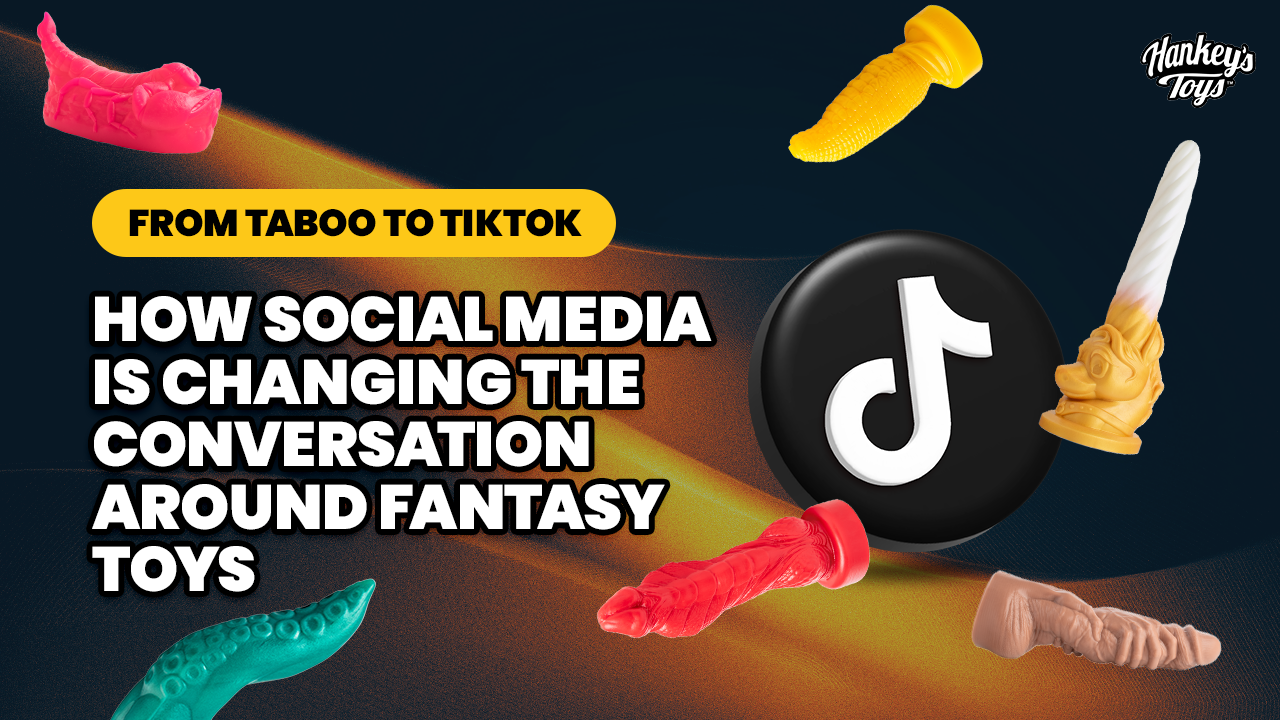From Taboo to TikTok Trends: How Social Media Changing the Conversation Around Fantasy Toys

In recent years, fantasy toys—or what many still view as "adult/niche/erotica-adjacent" products—have steadily entered mainstream awareness, largely thanks to social media's powerful amplification. Once confined to obscure forums, these items now appear in subtle TikTok teases, Instagram captions, and lively Reddit discussions. Brands like Mr. Hankey's Toys are leading this charge, expertly navigating evolving platform rules, testing creative limits, and reshaping public conversations around fantasy toys on social media.
This shift isn't accidental. As younger generations embrace openness about sexuality, kink, and self-expression, platforms like TikTok have enabled taboo topics to go viral when framed aesthetically or educationally. But with censorship policies tightening in 2025, success demands innovative strategies. In this guide, we'll explore the un-tabooing process, the policy hurdles, real-world tactics, and a deep dive into Mr. Hankey's Toys. Whether you're a brand owner or curious consumer, you'll walk away with actionable insights for marketing adult toys on TikTok, Instagram, and beyond.
The Un-Tabooing of Fantasy Toys on Social Media
Fantasy toys aren't just functional; they're infused with narrative, mythology, character, and fandom appeal, making them easier to integrate into pop culture than purely erotic items.
Fantasy as Identity and Art
Take pioneers in the fantasy toy manufacturing space. Some of these brands specialize in fantasy-themed sex toys inspired by dragons and mythical creatures, targeting the furry fandom. By emphasizing imaginative worlds over explicit utility, companies position their products as collectible art—think custom silicone dragons with lore backstories. This narrative approach has helped them build a loyal community, with social media posts focusing on design processes and fan art rather than direct sales pitches.
Mr. Hankey's Toys follows a similar playbook, blending fantasy, myth, and playful worldbuilding into offerings like tentacle-inspired designs or alien forms. This "narrative elasticity" allows brands to discuss fantasy toys on social media without immediately triggering flags, turning products into conversation starters about creativity and identity.
Social Normalization via Communities
Fandom cultures—furries, LGBTQ+ groups, role-play enthusiasts—overlap with fantasy toy interests in areas like costuming and character design. As these communities gain visibility (e.g., via Pride events amplified on Instagram), platforms grow more tolerant of "gray area" content. Reddit's r/SexToys subreddit, for instance, boasts over 300,000 members sharing reviews and tips, fostering organic normalization.
Cultural Shifts and Openness
Younger generations, such as Gen Z and millennials, are spearheading greater openness around sexuality and self-expression. For instance, Lifetime's 2025 "Money & Mindset" report reveals that over 60% of Gen Z adults—rising to 63% among Gen Z women—are comfortable discussing their sex lives, signaling a broader willingness to engage on intimate topics online. TikTok stands out in this landscape, transforming potentially taboo subjects into viral sensations through creative, aesthetic framing. A quick video exploring "mythical self-care routines," for example, can easily garner millions of views, seamlessly blending fantasy toys into everyday cultural chats.
Social Media’s Censorship Ecosystem: Rules, Red Lines, and Workarounds
Navigating social media censorship for sex toys remains a high-stakes game in 2025, with platforms enforcing strict rules amid growing scrutiny over child safety and explicit content.
The Policy Minefield
Major platforms like Instagram, Facebook, TikTok, and Meta prohibit nudity, sexually explicit visuals, or genitalia depictions—even in educational contexts. TikTok's updated 2025 guidelines, for example, ban adult nudity but allow limited exceptions for sex education or art, provided it's not promotional. No close-ups of toys in use, no demos, and vague function descriptions are off-limits.
Keyword filtering is another hurdle: Terms like "dildo," "cock," or "insertable" often get suppressed algorithmically. Euphemisms can also trip filters, forcing constant A/B testing. Advertising is even tougher—Facebook outright blocks paid promotions for products related to sexual wellness. Brands must pivot to organic growth via influencers or communities.
Marketplaces aren't immune: Etsy's July 2024 ban on penetrative sex toys and erotic items delisted thousands of shops overnight, prompting a scramble for alternatives. M. Mickey of Mr. Hankey's Toys shared in interviews that the news broke via social media alerts, underscoring the volatility.
Creative Workarounds and Strategies
Suggest, Imply, Evoke: Skip direct shots; use metaphors like flowing fabrics or shadowy curves. Captions like "Dive into untold realms of sensation" build intrigue without specifics.
Educational Content Pivot: Frame posts as wellness guides—consent tips, material safety, body positivity. This adds value, dodging flags while educating.
Soft Launches and Teasers: Drip-feed colors, textures, or patterns to hype without revealing the full details. Funnel traffic to age-gated sites.
Influencer Amplification: Creators embed hints in their personal stories, leveraging the leniency of "user-generated" content. Stories or DMs extend reach privately.
Age-Gated Communities: Use social as a funnel to Discord servers or Patreon for unfiltered chats.
Micro-Platforms: Lean on adult-friendly spots like FetLife or niche forums with looser rules.
Policy Challenges: Brands like Dame Products and Unbound launched the "Approved, Not Approved" campaign in 2019, spotlighting rejected ads to pressure platforms for fairer enforcement. Sustained advocacy has led to nuanced updates in 2025, such as TikTok's expanded education exceptions.
2025 Metrics: Fantasy Toy Virality on TikTok
To quantify the shift, let's look at data. TikTok ads for toys boosted engagement by 45% in 2025, outpacing Instagram by 70% for viral challenges. Fantasy-themed content sees even higher lifts: Hashtags like #FantasySelfCare garnered 2.3 billion views YTD, with 25% involving subtle toy nods. A single fantasy-inspired unboxing video garnered 1.5 million likes, resulting in a 12% traffic spike to brand sites. These statistics highlight TikTok's role in normalizing fantasy toys on social media, as well as the need for compliant creativity to sustain momentum.
Mr. Hankey’s Toys: A Case Study in Navigating Boundaries
Mr. Hankey's Toys exemplifies resilience in this landscape. Their site proudly states products are "designed for adult purposes" with robust age-gating and warnings.
Brand Identity as Shield and Signal
By owning their fantasy-erotica niche, they set clear expectations—inviting scrutiny but enabling bold storytelling.
Diversified Sales and Traffic Ownership
Following Etsy's 2024 ban, Mr. Hankey has doubled down on direct e-commerce and wholesale, thereby reducing third-party risks.
Subtle Marketing, Storytelling, and Community Tactics
Evocative photography, lore-driven narratives, and euphemisms keep content filter-safe. They nurture newsletters and creator collabs, turning fans into advocates. In a 2025 campaign, teasing "cosmic explorations," we routed 40% more traffic via Reddit AMAs.
Adapting Fast and Monitoring Policies
Daily scans of takedowns and algorithm tweaks ensure agility—e.g., swapping "insertable" for "immersive companion" after a flag wave.
How Social Media is Rewriting the Conversation
Social media reframes fantasy toys as art, wellness tools, and empowerment aids, chipping away at the stigma. Viral TikToks on self-acceptance can spark memes, boosting visibility. Yet backlash persists—debates on decency require thoughtful moderation. Feedback loops drive innovation: User polls on textures have led to the development of new silicone formulas tailored to current trends.
2026 Predictions: AI Moderation's Impact on Niche Toys
Looking ahead, AI-driven moderation (as per Google's 2025 Core Update) will scrutinize context more deeply, potentially easing the detection of educational content but tightening euphemism detection. Expect 20% more bans for "implied" erotica, which will push brands toward Web3 communities or VR demos. Success will hinge on the development of ethical AI tools for compliance testing.
Best Practices and Tactical Roadmap for Fantasy/Niche Toy Brands
|
Goal |
Strategy |
|
Stay Visible Without Flags |
Use subtle imagery, metaphors, indirect language; test via small posts before scaling. Target long-tails like "how to promote fantasy dildos on Instagram without bans." |
|
Build Off-Platform Funnels |
Treat social as awareness; direct to Discord, sites, or lists for deeper engagement. |
|
Leverage Creators & Micro-Influencers |
Partner for authentic hints—they post what brands can't, tapping Reddit or TikTok niches. |
|
Prioritize Organic Content |
Focus on shareable education (e.g., "Etsy ban alternatives 2025"); skip blocked ads. |
|
Monitor and Adapt |
Track policy shifts using tools like SocialBlade and pivot proactively. |
|
Frame as Culture/Wellness/Fantasy |
Highlight consent, storytelling, and safety over function for broader appeal. |
|
Diversify Sales |
Own your storefront; explore wholesale and alternatives to Etsy or TikTok Shops. |
Conclusion
From hushed forums to TikTok trends, social media is legitimizing fantasy toys by cleverly navigating the red lines. For brands like Mr. Hankey's, the future favors those blending storytelling, community, and compliance. By prioritizing helpful, human-centered content, you're not just marketing—you're sparking empowering dialogues.














